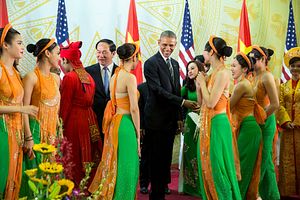U.S. President Barack Obama is in Vietnam for a three-day official visit and the Vietnamese people just can’t seem to get enough of him. Throngs of people waited for hours for his arrival on Air Force One arrival on late Sunday night and hundreds lined the streets everywhere he went on the first day in Hanoi. The excitement in Vietnam for a visit of a world leader has never been this high.
The media frenzy has been unbelievable, with reporters tracking the U.S. president’s every move in seconds, every single detail from his bodyguards to his motorcade to his hotel. Social media seems about to explode, with nearly the entire news feed filled with posts related to Obama’s visit.
The Vietnamese, who are new to the idea of seeing government leaders out on the street to eat local dishes, marveled at the U.S. president eating “bun cha” (grilled pork noodles) at a typical street food eatery in Hanoi on Monday night with Anthony Bourdain.
Vietnamese people greeted Obama like a national hero. His visit brought about the end of the 41-year U.S. arms embargo and new business deals worth US$16 billion. But the locals also see Obama as a symbol of change. This is particularly noteworthy during a time when people are desperate for change in how the government works to improve transparency, governance, and people’s lives.
That thirst for change was also evident in Vietnam’s election, coincidentally held during Obama’s visit. On Monday, state media reported that nearly 97 percent of the country’s 70 million eligible voters turned up for the general election, a voter turnout rate that many other countries envy.
Locals here are fully aware their votes do not carry much weight in yet another carefully staged election to select 500 parliamentary members out of the 800 candidates chosen ahead of time by the National Assembly. This year was particularly unusual due to the number of independent candidates who attempted to make it onto the ballot, though many were forced to opt out of the race.
In these elections, held every five years, candidates do not appear before their constituencies and do not have agenda or policies. Not surprisingly, people are indifferent. This year, however, a group of young voters created an online platform called danbieu.info to make information about candidates more user-friendly and appealing. People also advised one another online to vote for lawyers, as they seem to be the most vocal about government policies and protecting vulnerable citizens. But these were just sporadic attempts by people who want to make sense of another predictable election.
Instead, Vietnam’s people are more interested in the scandal of massive fish deaths which has ravaged the nation for months, spurring protests during the past three weeks. People have been fed up with the government’s slow response to address one of the worst environmental disasters in decades, rumored to have been caused by Hung Nghiep Formosa Ha Tinh Steel Corp (part of the Taiwan-based Formosa Plastics Group). Activists and civil groups have been fighting hard to get more government attention on this issue; some protesters were reportedly beaten and accused of being in line with foreign reactionary forces.
Also on election day, a deadly traffic accident in the central province of Binh Thuan killed at least 12 people and injured 35 others. In a country that averages 10,000 traffic-related deaths per year, the news was soon to be buried under more headline-grabbing material.
Surely, people in Vietnam are desperate for stronger environmental regulations, and for better roads and enforcement of traffic laws.
Obama’s visit might bring some short-term enlightenment for several days, but when people come back into reality, what they aspire for is some change from their own government, not from a foreign country.
On his first full day in Vietnam, the U.S. president did not mention the fish scandal in any of his events. However, at a press conference, Obama stressed that the sale of U.S. military equipment to Vietnam must be based on strict requirements, including those related to human rights – but implementation will be on a case-to-case basis.
Obama met with representatives of some civil groups in Hanoi on Tuesday morning, at which time he said ultimately it was up to the Vietnamese people to determine how their society functions and the nature of their government. The tough task of making the Vietnamese government be more transparent in elections or in the fish deaths scandal is beyond Obama’s capacity — or the role of any U.S. president. Seemingly, human rights issue is not a card that the U.S. government can play all the time in its bilateral relations with Vietnam. Changes must come from within.
Huong Le is a journalist based in Hanoi.































